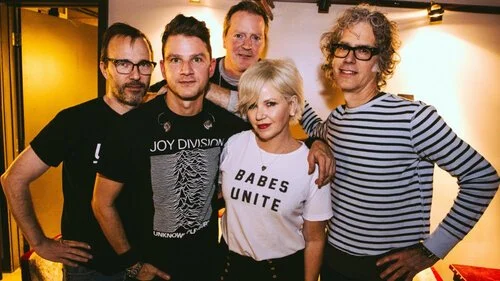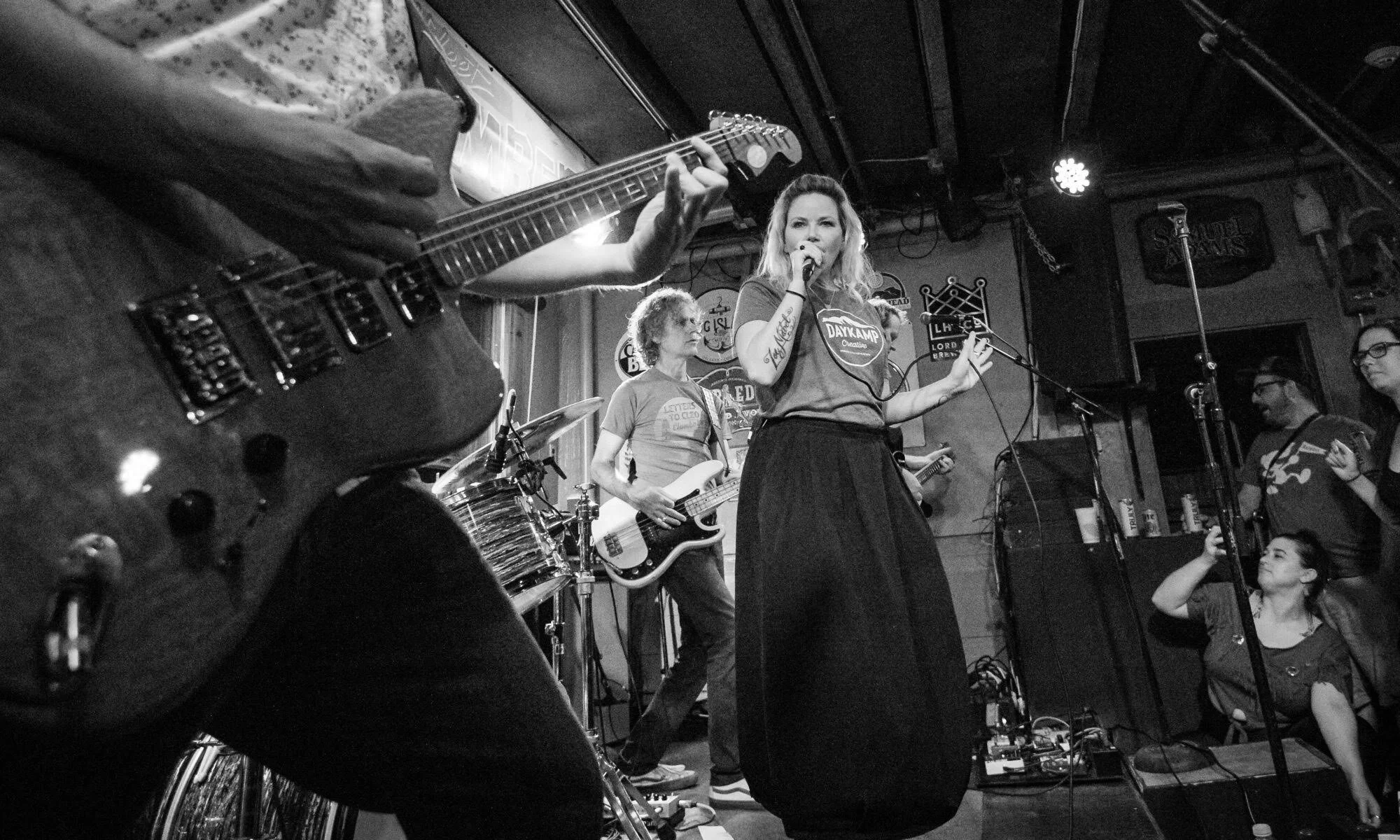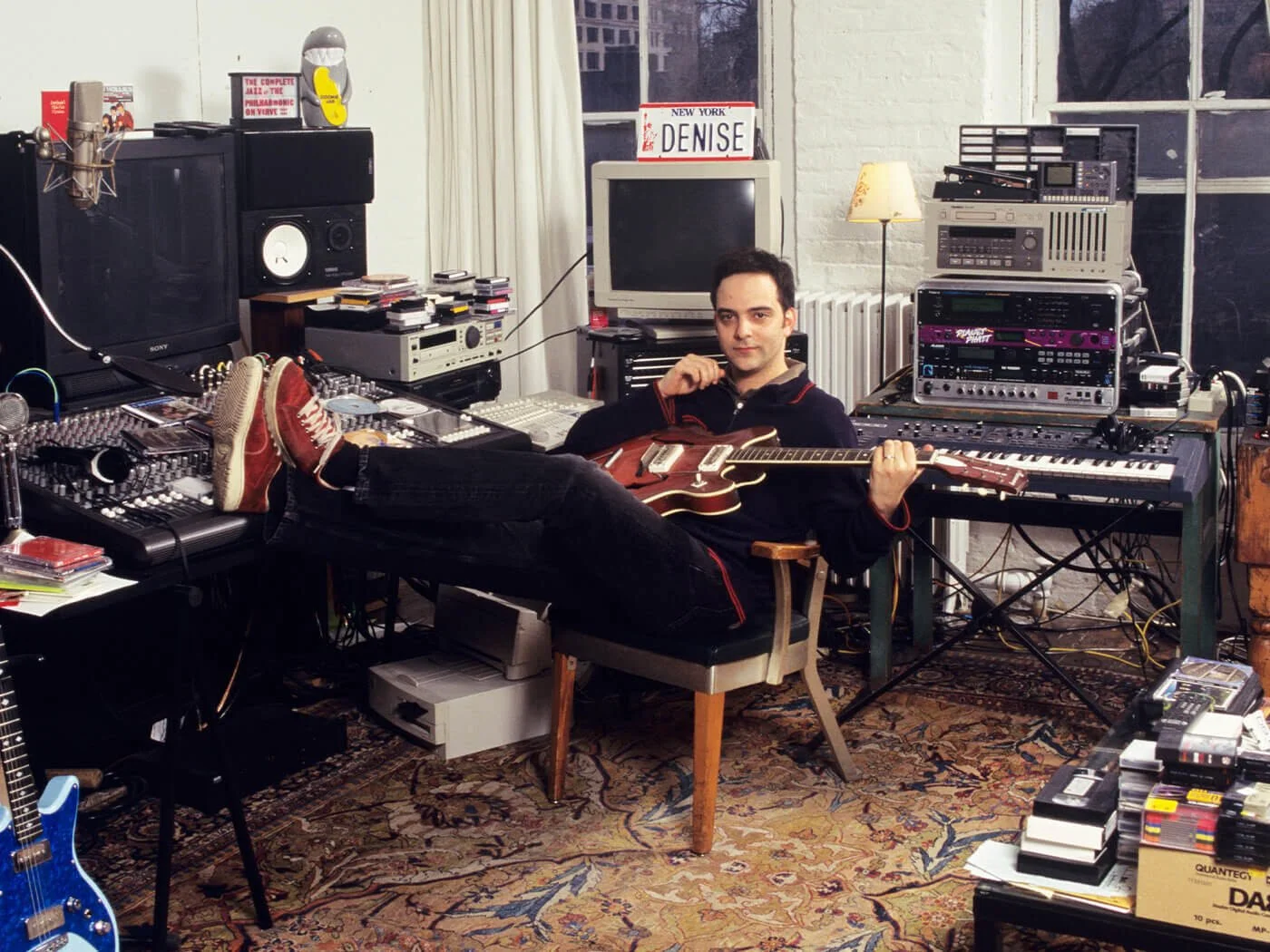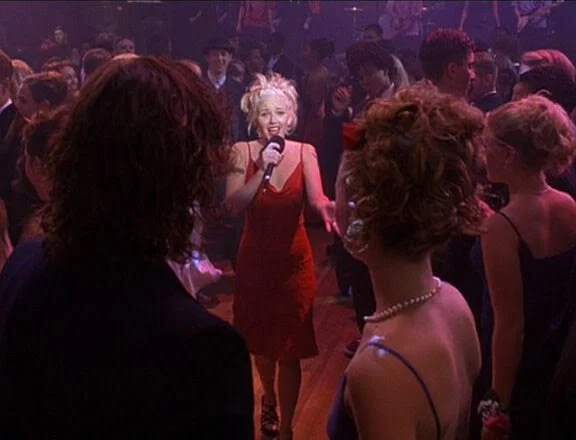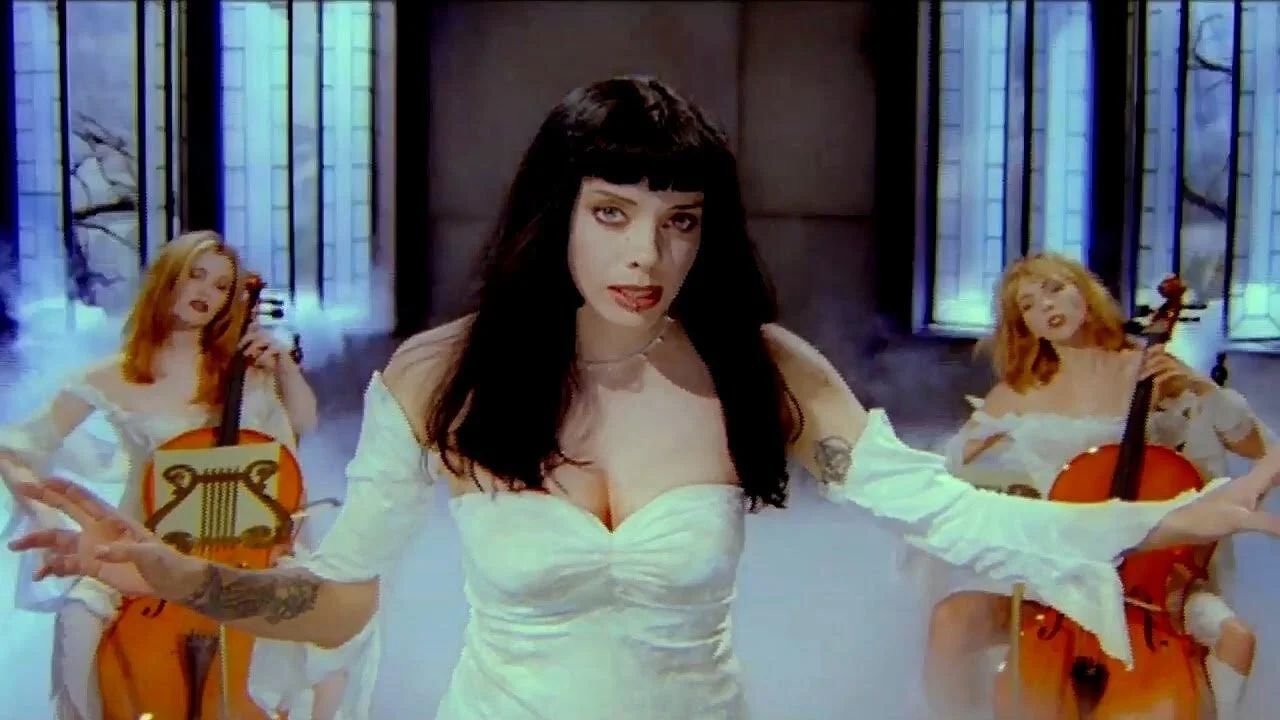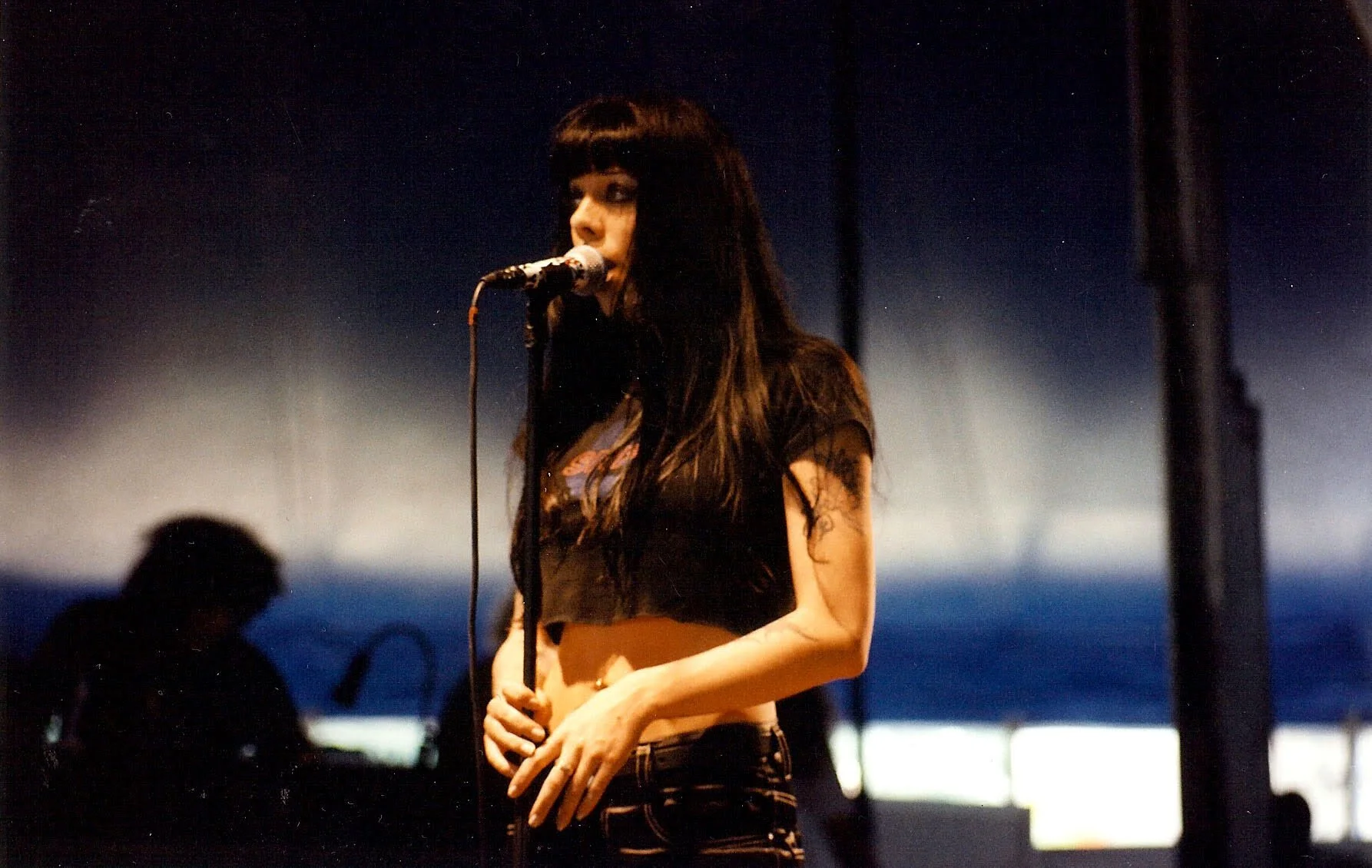Episode 4: soundtrack — Josie And The Pussycats Soundtrack: “The Best Debut Album By A Band That Doesn’t Actually Exist”
With a pick ‘n mix of musical talent, everyone from Kenny ‘Babyface’ Edmonds to Letters To Cleo began working on the film’s strongest asset, the songs, writes Maria Lewis
When it comes to experts on both a) film b) music and c) how those two things interconnect, there’s few people expertier than Mo Shafeek, record label manager at Mondo Records. In 2017, some 16-years after the Josie And The Pussycats film was released in cinemas, he was a key driving force behind not only a reunion concert but the first ever vinyl pressing of the movie’s soundtrack. That’s how important it is to him. “It’s the best debut album by a band that doesn’t actually exist, while also being one of the greatest soundtracks to a 2001 music scene film,” he says. “There’s no film that more accurately captures the genre of music at that time, at least here in the states. I’m talking right at the beginning of the ascent of your Blink 182s and the prevalence of pop punk in the music scene.”
As not only a huge fan of the film but as a music professional, Shafeek understands the significance of the Josie soundtrack. In fact, a lot of the audience might have been confused about the ‘consumerism masquerading as identity’ message of the film, yet they never struggled to connect with the music. “For the people who would be familiar with Total Request Live (TRL) and the cultural impact of it, this sound is so baked into your brain of what music sounded like that it’s quite brilliant in its design that way,” says Shafeek. “It’s such an effective parody and also sincere document - it’s so many things … The generation before me, when they would make mix tapes there was probably some very iconic eighties and seventies rock songs and ballads. I think about the songs that I would put on a mix tape and they would be from the Josie And The Pussycats soundtrack, amongst other things from that era. That’s the closest thing to putting an obscure song on, right? Because if you hadn’t seen the movie then you definitely didn’t know who this was.”
With writers and directors Deborah Kaplan and Harry Elfont locked in and their script approved, the next step was making their movie musical a reality. It wasn’t a traditional musical, of course, not in a Sharks Vs Jets kinda way. Yet for a movie about the music business and featuring music extensively, that music needed to be good. “I think the thought was how do we … we’re not songwriters,” says Elfont. “We have a script where we talk about these great songs, we talk about hit songs, so we knew we wanted these songs to be good: we didn’t want them to suck. That Thing You Do had done it with one song that they just played over and over again. We needed five songs at least that we know sounded great. So how do you do that?” The Pussycats themselves were being finalised simultaneously with Rachael Leigh Cook as Josie, Tara Reid as Melody and Rosario Dawson as Valerie, while the studio Universal recruited 11-time Grammy Award winner Kenny ‘Babyface’ Edmonds. “He was excited because it wasn’t his sound, he hadn’t done a kind of pop rock,” says Elfont. “We talked about them being a power punk pop band and that wasn’t his genre … Deb especially knew a bunch of musicians and he was open to like ‘yeah, let’s bring all these people in, let’s find it’.”
That Babyface sound was dominating charts at the time, particularly through the boy bands that DuJour parodies – including *Nsync, Boyz II Men and Dru Hill (who Babyface had all worked with on seminal hits). He basically invented the DuJour sound – that pop/RnB fusion - but as the executive producer of the soundtrack, the DuJour sound was just a small part of it. Two songs, in fact: Backdoor Lover and (DuJour) Around The World. The rest of the tracks are a few covers – Money (That’s What I Want), Real Wild Child and an updated version of the Josie And The Pussycats theme song from the Hanna Barbera animated series. All up that’s five tracks on a 13 song album and those other songs are the crux of it – they’re supposed to represent the essence of what Josie And The Pussycats was, is, and what they could be. So to recap there was Babyface, obvs, and his wife at the time Tracey Edmonds, Adam Schlesinger from Fountains Of Wayne, Adam Duritz from Counting Crows, Dave Gibbs from Gigolo Aunts, and then eventually Kay Hanley and Michael Eisenstein from Letters To Cleo (who were married at the time and had just had their first child). That was the main crew, then popping in for heat checks were Jane Wiedlin from The Gos Gos, Jason Falkner from Jellyfish, Matthew Sweet, Steve ‘Silk’ Hurley, and Anna Waronker frontwoman of That Dog, Bif Naked, and Dee Dee Gipson. It’s an eclectic mix of musical talent and it’s wild to think about how cohesive the end result became.
Part of that was to do with Kaplan and Elfont, who not only wrote the lyrics for a bunch of the tracks but were in close collaboration with Babyface to steer the soundtrack where they needed it to go. The highlight for both of them was the movie’s big fake hit – Pretend To Be Nice. “We didn’t write that one,” says Kaplan. “Schlesinger knows his way around a hit … And I wasn’t sure, but I think Pretend To Be Nice he had siting around. He had a sketch of it or something, I don’t know that it was a … like he grabbed it out of thin air.” Schlesinger was probably best known for Fountains Of Wayne, who dropped their debut self-titled album in 1996 but didn’t have their biggest hit – the very Cars-esque Stacy’s Mum – until 2003, right at the start of the naughts. They never had a No.1 hit– or even a top 20 hit – but Fountains Of Wayne were a hugely important act for that era and their influence is still felt now largely thanks to the great songwriting and production of the group.
Their music was infectious, great hooks, clever lyrics, and an underlying sweetness you might not expect. As they were blowing up as a band - simultaneously - Schlesinger had been working in film and television. His first credit was as the music supervisor on House Of Buggin in 1995, which has this cult status for being the spiritual sequel to In Living Colour and was John Leguizamo's breakout sketch comedy show. Just a year later in 1996, Schlesinger worked on Dana Carvey’s sketch show, Saturday Night Live and Tom Hanks directorial debut, That Thing You Do, which saw him receive an Oscar nomination for Best Original Song with the track that gives the movie it’s title. “I think I just always had the attitude that I wanted to be involved in music in whatever way I could and that I wouldn’t close any doors,” says Schlesinger. “I’d rather be doing something involving music than having some other kind of job. If somebody asked me to try something for a movie or a TV show or whatever it was, it was sort of another chance to work and another chance to be involved with other projects and work with other people. Over the years I’ve come to like it more and more and I’ve come to feel like I’m good at writing when I have an assignment like that. I’m probably better at that than being told ‘go make a record, do whatever you want’ and sort of follow my own muse. I like being given some parameters. So something like this, you know, the parameters were ‘we want it to sound like a hit, it’s Josie And The Pussycats’ and even that is kind of an assignment.”
It was during a party in Los Angeles when Fountains Of Wayne were on tour that Schlesinger first me Kaplan and Elfont and he played them his initial idea for Pretend To Be Nice on the guitar. They loved it and that was his first step of involvement on the project. “I don’t know, for some reason I’m better at writing fake ones than real ones,” he says. “I have friends that write songs that are actual hits all the time. For me it’s like some kind of clutch when somebody says ‘oh well, it’s going to be a hit in this movie, we’re going to just tell everybody it’s a hit’ and that helps it feel like a hit to people. I think in the real world for something to be a hit there’s just so many mysterious factors and just having a catchy song is not the only thing: it’s the artist, it’s the promotion around that artist, the image and there’s just all these intangible things that make something a hit.”
When Schlesinger first signed on, he had no idea who would be producing the album or who else was involved: only that the assignment was to write a big hit for Josie And The Pussycats. “I remember I stopped by the studio, I don’t think they’d actually started recording … and having a little sit down with Babyface in the studio. I played him Pretend To Be Nice and I sung the little hook part in my mind that was going to be an instrument so I was going ‘oh oh oh oh’. I said ‘I don’t really know what that’s going to be yet, that’s going to be guitar or something, maybe it’s horns’. And he’s like ‘oh, are you kidding me? That’s a vocal, that’s the hook’. He was the one was like ‘just let that be sung’ and when he said that, he said it with total producer confidence … I was like ‘oh, we’re in good hands with this guy – he’s got this’.”
Enter stage left, another seminal nineties act: Letters To Cleo. They weren’t dissimilar to Fountains Of Wayne and even Counting Crows in that they were successful - they weren’t underground, but they weren’t mainstream either – and they were generally hugely respected by the music industry. They also had this frothy cult fandom that somehow intersected with pop culture. That happened in 1999 when Letters To Cleo appeared in 10 Things I Hate About You not just once, but multiple times as they play in a club, interact with the characters at the prom, play over the radio, and even close the movie by playing hundreds of feet up in the air on the rooftop of the freakin school where they filmed the movie as a helicopter loops around and gets that nutso shot for the end credits (which is such a nineties thing, just letting the credits roll over actual continued footage i.e Silence Of The Lambs, The Jackal, The Fugitive, Twister, The Saint).
Hanley had first come in to sing what she thought were backing vocals and maybe write a few of the songs on the album, while also taking Rachel, Tara and Rosario through a type of rock star band camp where they rehearsed their moves in a mirrored room. She’d always been a fan of Archie Comics as a property but this – co-writing the songs and becoming the singing voice of Josie – was not work she was actively pursuing. “To me it was just one of those weird experiences that I fell ass backwards into over a period of time,” she says. “That was kind of the Cleo way, just shit would go down and we’d be like ‘okay’ … I didn’t really have any plans to get into that kind of work. I had just had a baby: my daughter Zoe Mabel was about 10 months when I got the call from my friend Dave Gibbs who was in another Boston band called the Gigolo Aunts. He had moved to LA and he was living in Adam from Counting Crows guest house … Deb and Harry were making the movie and they found Dave to start putting songs together.”
By that point, Schlesinger had been brought back in too to produce and co-write the remaining songs to fill out the album after Pretend To Be Nice was received so well among the team and the studio. There had originally been another woman tasked with singing the part of Josie – Dee Dee Gipson – however little did Hanley know how that situation would come to impact hers until much later. “In between us leaving Boston and getting to LA they fired the original Josie singer,” she says. “Long story short, it put me in a position to swoop in and take the job for myself. It was very much a right place, right time kind of thing and we ended up with our little baby, living in a hotel room.” That OG Josie Hanley speaks about – Gipson – is credited as the songwriter on tracks You Don’t See Me and underrated bop Come On. She had come from an all-black, all-girl rock band out of Atlanta called Edith's Wish, which had sprung up in 1995 and although she had been hired on the project originally she was fired … in a way. Just like Hanley too ended up finding herself fired … in a way.
“Well, I’ll spill the tea a little bit,” she says. “The story is a little bit longer than I originally told you, so I’m gonna expand. When we got to LA and we started going into the studio to sing these songs that Dave, my very dear friend Dave Gibbs had written with a variety of people like Jane Wiedlin, Ann Waronker, Adam Duritz and he had been making the rounds writing these songs. Dave really wanted me to get this job, but I was not a shoe in, but I didn’t know that. I was going to the studio every day and we had extended our stay and I would go in and I would do my best to sing the songs. But you know, singing for me … it doesn’t come really easily and it’s kind of an emotional thing: if I get flustered I just can’t do it. So I felt all this pressure all of a sudden.” At this point, Hanley and Letter To Cleo had been kicking around for almost a decade, but she didn’t think of herself as a vocalist per say. “I never considered myself a singer,” she says. “I was the singer in Letters to Cleo because I wrote the lyrics and there was no-one else to sing them, so I sang them. I never wanted to be a singer it just kind of happened.”
“So I’m going into the studio every day with, you know, Dave and Babyface and Deb and Harry and I’m at the microphone singing these songs, which I’ve also never sung anybody else's songs so that’s another thing. They’re talking to each other in the sound booth and I’m singing and I’m just like… it created a lot of angst for me, I just didn’t understand what was happening. I would go back to the hotel, Michael and I would have dinner with the baby and hang out and then they’d be like - take tomorrow off. And I’d be like ‘okay’.” One day became two, then three, then several and Hanley heard through her manager that another singer was being brought in to audition for Josie. “As if Deb and Harry and Babyface and everybody had been scouting all of my friends to see if they would do a better job than me,” says Hanley. “So it was really awful and finally - I’m there for like three weeks - and I was like I’m here with a baby and I want to go home at some point, you know? … I was like ‘fuck this, I’m going home, book us plane tickets we’re leaving’. And we did. Then a couple of days later I got a call from Babyface saying ‘will you come back?’ and I said ‘why?’ and he said ‘because I really feel like you should be the person to do this and I want you to do this’. So that’s how it really went down.”
Although the road to get there and to get locked in as Josie’s singing voice hadn’t been smooth at all - and had been kind of shitty situation - there were some really special moments for Kay Hanley as well: like during the recording of the album’s lone slower tempo track, You Don’t See Me, in Babyface’s home studio in Beverly Hills. “I was like ‘well Babyface thinks I’m a singer, that’s interesting’,” she says. “He just basically was so gentle with me in the studio, the opposite of what it was like when I first came out and everyone was just whispering in the control room and I’m freaking out … It was gentle and encouraging and I really felt like he got me to sing that song in a way that I had never sung a ballad. I never had any interest in singing a ballad and to me hearing that song is just such a reminder of what you can do if you have someone supporting you and mentoring you … He was a life changing presence in my life in a million different ways.”
There was yet another cult nineties figure in the mix too among all of that, someone brought in to do backing vocals: Bif Naked. “I was on tour at the time in America and it was my record company – Lava Records - that I guess just told us about the opportunity,” she says. “For me of course to be able to work with BabyFace was the thrill of my lifetime … I was a huge Toni Braxton fan, that might sound random, but I was a massive, massive fan. Just to have the opportunity to work with him – could have been on anything – and I would have been thrilled. To be able to harmonise with Kay Hanley of whom I was such a huge fan – she’s in Letters To Cleo – it was like a dream come true.” That descriptor of Letters To Cleo, Fountains Of Wayne, Counting Crows being that cult cool thing that unexpectedly crossed over into pop culture at times? That 10,000 per cent applies to Bif Naked as well.
Bif was big in Canada and was crossing over into the US in the nineties with her music being used in shows like The West Wing, Daria, Charmed, Roswell and – of course - Buffy The Vampire Slayer where she popped up playing herself singing her track Lucky as Buffy slow dances with Sunnydale’s resident fuckboi Parker. Yet although she’s not as known for her work on Josie as she is, say, Buffy, the opportunity to be involved in the project was a dream come true. “At the time, Tara Reid was very famous,” says Bif. “It was cool, man. They came in while we were doing our recording session – I think they did a news feature on the actresses in the film – so they all came in to the studio and lip synched the songs into the mic for part of their news shot. The whole thing was such a thrill. Babyface flew me first class, I’d never flown first class before – it was such a dream.”
Bif had such a good time and has such fond memories of the crew and the work that she has a hard time picking a favourite track from the album. Cook, on the other hand, knows immediately. “I love how fast 3 Small Words is,” she says. “It’s just that hard, hard, hard pace.” 3 Small Words opens the soundtrack and it’s also the first Josie and the Pussycats song you hear them play in the movie, when they’re still just the riot girl grunge babes from Riverdale and not the superstars they’re destined to become. Schlesinger’s own favourites were a little more unexpected, especially given so much of the spotlight is drawn to 3 Small Words and Pretend To Be Nice coming so early on the album and the movie. “I don’t know if it was my favourite but there’s this song called Come On that has like 10,000 writers on it,” he says. “I think that’s one of the ones I produced and I just remember thinking it was funny because in the end it’s a really simple song, but when you look at the credits it’s like everybody threw something in to that song. I liked it for that reason, everyone put in their two cents … I love Shapeshifter, I mean Shapeshifter sounds like just a great Letters To Cleo single.”
The album was a moderate success when it dropped in March, 2001 just a few months before the film would be released in the hope that it would help generate buzz for the film. It sold more than 500,000 copies in the US - making it a certified gold album – and was popular internationally too, especially in places like Australia and New Zealand. “I mean, I guess it was a hit,” says Schlesinger. “It did alright, but it wasn’t like this smash hit album. It was still a cult thing … I know it has been a movie and a record that has sort of found its own afterlife and I think that’s awesome. Especially with that power punk pop punk stuff, it sometimes takes some unusual exposure for people to pay attention to it.”
On April 1 of this year, at just 52, Adam Schlesinger passed away due to complications from coronavirus in Poughkeepsie, New York. Following the news of his death, there was an outpouring of grief from his friends and colleagues like Tom Hanks, Kay Hanley, and his frequent collaborator on Crazy Ex-Girlfriend - and the show’s star and co-creator - Rachel Bloom who said: “I have so much to say about Adam Schlesinger that I am at a complete loss for words. He is irreplaceable.” We couldn’t agree more. This past week, Fountains Of Wayne reunited in honour of Schelsinger with the three remaining members - Chris, Jody, and Brian - playing the Jersey 4 Jersey concert to benefit the New Jersey Pandemic Relief Fund (you can donate here).
This article is a written version of the Josie and the Podcats episode Soundtrack. Josie And The Podcats is a limited podcast series hosted by best-selling author, screenwriter and journalist Maria Lewis, and produced by Blake Howard of One Heat Minute. New episodes release every Sunday, with bonus episodes during the week.
